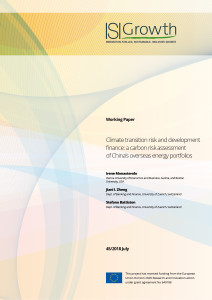The role of development finance institutions in low-income and emerging countries is fundamental to provide long-term capital for investments in climate mitigation and adaptation. Nevertheless, development finance institutions still lack sound and transparent metrics to assess their projects’ exposure to climate risks and their impact on global climate action. This information is crucial to allow them to deliver on their mandate, to preserve their financial position and to align beneficiary countries’ economies with the climate goals. We contribute to fill in this gap by developing a novel climate stress-test methodology applied to the loans portfolios of overseas energy projects of two main Chinese policy banks. We estimate their exposure to two types of shocks, i.e. climate policy and idiosyncratic shocks, that could affect individual energy projects across regions and energy sectors, under climate policy scenarios consistent with the 2 degrees C target. Then, we provide several risk metrics. We find that the negative shocks are mostly concentrated on coal and oil projects and vary across regions between 4.2% and 22% of total loans value. Given the current leverage of Chinese policy banks, these losses could lead to severe financial distress for them, with implications on macroeconomics and finance.
Climate transition risk and development finance: a carbon risk assessment of China’s overseas energy portfolios
Irene Monasterolo
Vienna University of Economics and Business, Austria, and Boston University, USA
Jiani I. Zheng
Dept. of Banking and Finance, University of Zuerich, Switzerland
Stefano Battiston
Dept. of Banking and Finance, University of Zuerich, Switzerland

